Spring 2021
Renowned Social Psychologist Prof. James Waller on “Becoming Evil: How Ordinary People Commit Genocide and Mass Murder” -- In Commemoration of the Liberation of Auschwitz by the Red Army The Center for Judaic, Holocaust, and Peace Studies along with Queens University’s Greenspon Center for Peace and Social Justice and UNCC’s Center for Holocaust, Genocide & Human Rights Studies invites the public to an online program with Prof. Jim Waller, the Cohen Professor of Holocaust and Genocide Studies at Keene State College (New Hampshire). Prof. Waller will speak on “Becoming Evil: How Ordinary People Commit Genocide and Mass Murder,” also the title of one of his most influential and pathbreaking studies. The presentation will start on Tuesday, January 26, at 7:00 pm EST. Based on an evolutionary perspective, Prof. Waller offers an equally intriguing and disturbing psychological view of how (almost) anyone can participate in genocidal crimes. The event also marks and commemorates the 76th anniversary of the liberation of the Auschwitz camps by a division of the Red Army’s First Ukrainian Front in January of 1945.
Dr. James E. Waller is the inaugural Cohen Professor of Holocaust and Genocide Studies at Keene State College, one of the nation’s oldest Holocaust resource centers. A widely-recognized scholar in the field of Holocaust and genocide studies, Prof. Waller widely researches, teaches andconsults for memorials, research centers, universities, government, and non-governmental institutions around the world. Among his many roles and accomplishments is the Directorship of Academic Programs at the Auschwitz Institute for the Prevention of Genocide and Mass Atrocities and lead instructorship for the Raphael Lemkin Seminars for Genocide Prevention. These well-respected seminars held on-site and in cooperation with the Auschwitz-Birkenau State Museum, introduce government officials and security sector personnel from around the globe to pressing questions of genocide warning and prevention. He is the author of five important books, including Becoming Evil: How Ordinary People Commit Genocide and Mass Killing, on which his talk is based, and Confronting Evil: Engaging Our Responsibility to Prevent Genocide (Oxford University Press, 2016). Organized by the Center for Judaic, Holocaust, and Peace Studies (CJHPS), Queens University’s Greenspon Center for Peace and Social Justice, and UNCC’s Center for Holocaust, Genocide & Human Rights Studies. Like (almost) all CJHPS events, this online program is free of charge and open to the public. For more information, please contact the Center at 828.262.2311 or holocaust@appstate.edu. |
Online Programs with Eminent Israeli-American Holocaust Scholar Prof. Omer Bartov (February 8) The public is invited to the first 2021 Center Research Colloquium on Monday, February 8, 11:00 am - 12:30 pm EST (17:00-18:30 Uhr MEZ). The event features Dr. Omer Bartov, the John P. Birkelund Distinguished Professor of European History at Brown University, and his research on a range of topics from the Holocaust in Eastern Europe to the Jewish-Palestinian conflict. The colloquium is co-organizedbyhe Center for Judaic, Holocaust, and Peace Studies, Appalachian State University, United States, and the CenterforReasearch on Antisemitism, Technical University of Berlin, Germany, with ASU's Department for Languages,Literaturesand Cultures. To prevent community spread and to keep everyone safe, this program will take place on ZOOM. Professor Bartov, who ranks among one of the leading and most accomplished Holocaust studies scholars worldwide, holds degrees from Tel Aviv University, Israel, and St. Antony's College, Oxford, UK. He has served as a professor, guest professor, and visiting scholar at many universities and research centers in the U.S., Germany, Israel, Taiwan andelsewhere. Since 2000, he has held the John P. Birkelund Distinguished Professorship of European History along with Professorships in History and German Studies at Brown University. Prof. Bartov first made his mark with much-noted research on the Nazi indoctrination of the Wehrmacht and the crimes it committed in World War II, resulting in his books The Eastern Front, 1941-1945 (1985) and Hitler's Army (1991). He subsequently turned to the links between total war and genocide, which he analyzed in his books Murder in Our Midst (1996), Mirrors of Destruction (2000), and Germany's War and the Holocaust (2003). Among his many other books and edited collections are Erased: Vanishing Traces of Jewish Galicia in Present-Day Ukraine (2007), an examination of the politics of memory in West Ukraine, and Anatomy of a Genocide: The Life and Death of a Town Called Buczacz (2018), a microhistory of ethnic coexistence and violence. Anatomy of a Genocide received the National Jewish Book Award and the Yad Vashem International Book Prize for Holocaust Research, among others, and has been translated into several languages. Reflecting his new interest, Bartov's forthcoming work entitled Israel/Palestine: Lands and Peoples turns to the country of his birth. Like all Center Colloquia, this event is based on (1) pre-circulated texts that we ask everyone to read prior to the meeting. Our guest will (2) give an introduction to the work, also situating it in the broader literature and highlighting some of the key insights. The event then will (3) mainly revolve around discussions of these texts and address all of the questions that participants may have. Towards the end of the colloquium, the focus will shift to (4) the participants and any questions they may have for our guest about their own research. To register for this ZOOM-based research colloquium, please click here. For more information, please contact ASU's Center at 828.262.2311 or holocaust@appstate.edu and the ZfA at 01149.30.314.25851 or sekretariat@asf.tu-berlin.de respectively. From 7:00 - 9:00 p.m. EST on the same day, Prof. Bartov will also give a public lecture entitled "Genocide from Below: Rewriting the Holocaust as First-Person Local History." For information and to get access to the ZOOM-based lecture, click here. Like all Center events, these online programs are free of charge and open to the public. |
Center to Host Prof. Havi Dreifuss, Director of Yad Vashem's Center for Research on the Holocaust in Poland, for talk on the End of the Warsaw Ghetto (March 1) The Center for Judaic, Holocaust, and Peace Studies proudly invites the public to an online lecture by Professor Havi Dreifuss (Tel Aviv University / Yad Vashem) live from Israel. Prof. Dreifuss' talk will center on the “Warsaw Ghetto - The End (April 1942 - June 1943)" and take place on Mon., March 1, from 11:00 am - 12:30 pm EST. A professor of Jewish history and the Head of the Institute for the History of Polish Jewry and Israel-Poland Relations at Tel Aviv University, Dr. Dreifuss also serves as the Director of the Center for Research on the Holocaust in Poland at the International Institute for Holocaust Research, Yad Vashem, Israel. Her path-breaking research deals with various aspects of everyday life during the Holocaust, including the relationship between Jews and Poles, religious life in light of the Holocaust, and Jewish existence in the face of extermination. Dr. Dreifuss' "We Polish Jews"? The Relations between Jews and Poles during the Holocaust – The Jewish Perspective (Jerusalem: Yad Vashem, 2009) made a critically important contribution to the ongoing public and scholarly debates over the Shoah in German-occupied Poland. Her latest book, on which the talk will be based, The Warsaw Ghetto - The End (April 1942 - June 1943), just won the Shazar Prize for the Study of Jewish History. Organized by the Center for Judaic, Holocaust, and Peace Studies, the program is co-sponsored by ASU Departments of History, ReligionandPhilosophy as well as the local chapters of AEPi and Hillel. Like all Center events, this online program is free of charge and open to the public. For more information, please contact the Center at 828.262.2311 or holocaust@appstate.edu. To attend, please register here. |
Center for Research on Antisemitism Director Prof. Dr. S. Schüler-Springorum (TU Berlin, Germany) to Give Keynote Lecture at German Studies Conference Hosted by ASU (March 18) Prof. Stefanie Schüler-Springorum (Berlin) will deliver the online keynote lecture of the 2021 Southeast German Studies Workshop hosted by ASU's Center for Judaic, Holocaust, and Peace Studies on Thursday, March 18, from 11:00 am until 1:00 pm EST (17:00-19:00 Uhr MEZ). In her lecture, Prof. Schüler-Springorum will discuss "Gender, Sex and Violence: Race Defilement in Nazi Germany." Since 2011, Prof. Schüler-Springorum has been the Director of the Center for Research on Antisemitism (ZfA) at the Technical University Berlin. The 1982-founded ZfA is the only center of its kind in the Federal Republic and has spearheaded many path-breaking research projects. A native of Hamburg, Germany, Schüler-Springorum holds a Ph.D. from the University of Bochum, where she completed her award-winning dissertation under the direction of Helga Grebing und Hans Mommsen. During the second half of the 1990s, Schüler-Springorum served as a research associate at the Foundation Topography of Terror in Berlin (under Prof. Reinhard Rürup) and taught at the TU Berlin's Center for Interdisciplinary Women's and Gender Studies. From 2001-2011, she was the Director of the renowned Institute for the History of German Jews in Hamburg. Prof. Schüler-Springorum is the author of Die jüdische Minderheit in Königsberg/Pr. 1871-1945 (1996); Krieg und Fliegen. Die Legion Condor im Spanischen Bürgerkrieg (2010); Geschlecht und Differenz (2014), and Braun Lectures in the History of the Jews in Germany (2018). Her co-edited volumes include (with K. Heinsohn) Deutsch-jüdische Geschichte als Geschlechtergeschichte. Studien zum 19. und 20. Jahrhundert (2005); Gedächtnis und Gewalt - Nationale und transnationale Erinnerungsräume im östlichen Europa (2016); and (mit Achim Rohde und Christina von Braun) National Politics and Sexuality in Transregional Perspective (2018). In addition, she serves as the co-editor of the prestigious Jahrbuch für Antisemitismusforschung. For more information on the speaker, For more information on the speaker, see here. The event is open to the public. To attend, please register here. For more information, please contact ASU's Center at 828.262.2311 or holocaust@appstate.edu. |
Center and Partners Organize Online Yom HaShoah Commemoration (April 7)On Wednesday evening, April 7, the Center for Judaic, Holocaust, and Peace Studies and its partner institutions mark the beginning of this year's Yom HaShoah (Holocaust Memorial Day) with an online commemoration and readings of names of European Jews murdered by the Germans during the Holocaust. The event co-organized with the Temple of the High Country and ASU’s Hillel and AEPi chapters will begin at 8:00 pm EST (and end at 9:00 pm). In response to the ongoing COVID-19 crisis, to avoid community spread, and to keep everyone safe, it will be held on a ZOOM platform. To register and receive a copy of the program, please click here. The registration form also has a section for anyone who would like to volunteer for a reading spot. To receive more information, please contact the Center at 828.262.2311 or holocaust@appstate.edu. |
The Center for Judaic, Holocaust, and Peace Studies invites the public to an online lecture by Dr. Noah Shenker (Monash University) live from Australia. Dr. Shenker's public talk is entitled "Beyond the Era of the Witness: Testimony, Digital Media, and the Afterlives of Holocaust Memory" and will take place on Thurs., April 8, from 7:00 - 9:00 pm EST. The event is also part of this year's Center programming for Yom HaShoah, the annual Holocaust Remembrance Day. To register for this public lecture, please click here. Dr. Noah Shenker is the N. Milgrom and 6a Foundation Senior Lecturer in Holocaust and Genocide Studies at Monash University’s Australian Centre for Jewish Civilisation. He holds a PhD in Critical Studies from the University of Southern California’s School of Cinematic Arts. Dr. Shenker's research and teaching traverse Jewish Studies, Holocaust and Genocide Studies, Cultural Studies, and Cinema and Media Studies. That interdisciplinary approach was at the center of his first book, Reframing Holocaust Testimony, published in 2015 by Indiana University Press as part of its Modern Jewish Experience series. Organized within a comparative framework, his book looks at three of the most extensive and distinctive archives of Holocaust testimony in the world: the USC Shoah Foundation Institute, the Fortunoff Video Archive for Holocaust Testimonies, and the United States Holocaust Memorial Museum. Dr. Shenker investigates how the cultural and institutional histories and practices of those sites mediate the encounters between interviewers and interviewees and consider the extent to which testimonies are driven by the agency of witnesses and the itineraries of a given archive. In addition, he has written and published extensively on the representation of the Holocaust and genocide in testimony, film, and new media. His contributions include “’I have never begun by asking the big questions’: Raul Hilberg as Historical Revenant in Shoah,” in the edited volume, The Invention of Testimony: Claude Lanzmann’s Shoah in the Twenty-First Century (Wayne State University Press, 2020) and “Through the Lens of the Shoah: The Holocaust as a Paradigm for Documenting Genocide Testimonies,” in History & Memory (2016). His current project (with co-author Associate Professor Dan Leopard) on which the talk is based -- and which is a parallel project to a joint research endeavor of the Holocaust Program at Western Galilee College, the Center for Advanced Genocide Research at the University of Southern California Shoah Foundation, and ASU's Center for Judaic, Holocaust, and Peace Studies -- explores Holocaust testimony beyond the "Era of the Witness" (A. Wieviorka). In addition to the evening, Dr. Shenker's illuminating work will be featured in an online Center Research Colloquium for students and faculty that will take place on the same day (April 8) from 3:30 pm to 5 pm EST.Organized by the Center for Judaic, Holocaust, and Peace Studies, the program is co-sponsored by ASU's Department of History. To register for this research colloquium, please click here. Like all Center events, these online programs are free of charge and open to the public. For more information, please contact the Center at 828.262.2311 or holocaust@appstate.edu. |
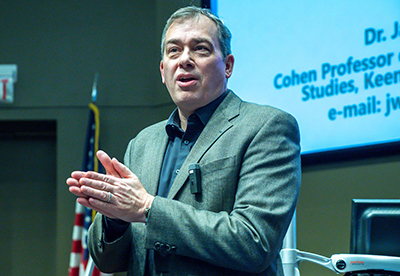
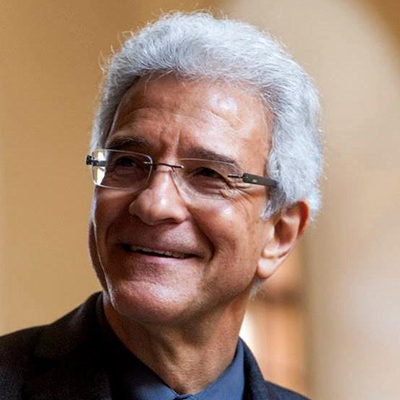
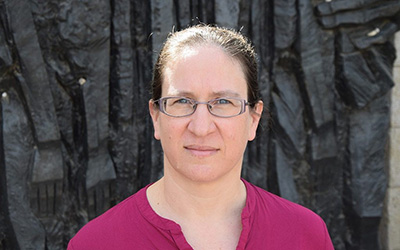
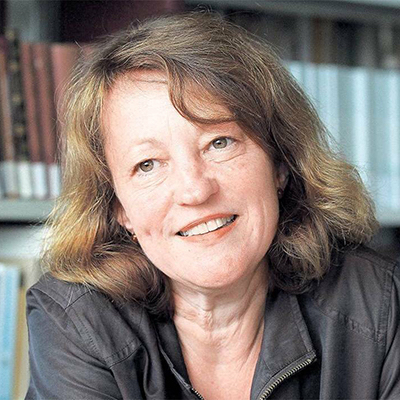
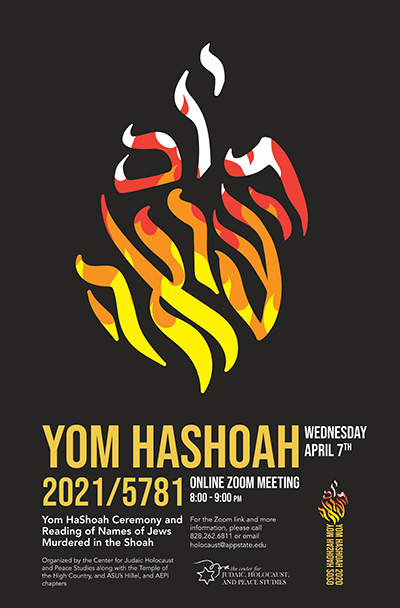
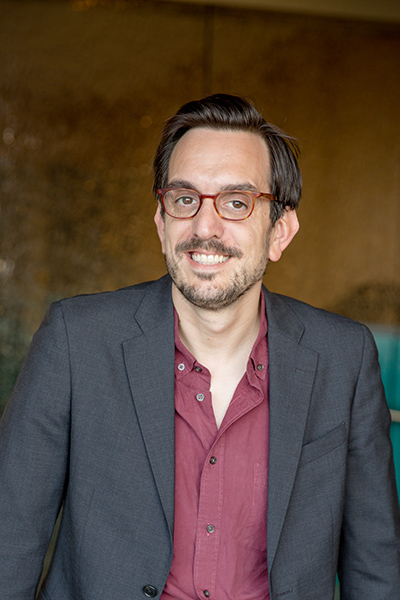 Center to Host Online Programs with Dr. Noah Shenker (Monash University, Australia) on the Future of Holocaust Testimony (April 8)
Center to Host Online Programs with Dr. Noah Shenker (Monash University, Australia) on the Future of Holocaust Testimony (April 8)